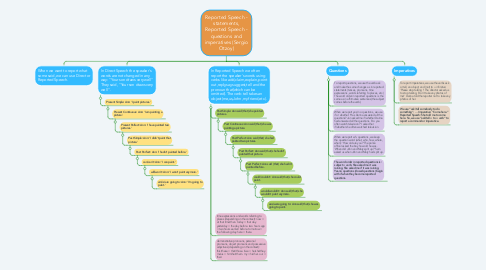Reported Speech - statements, Reported Speech - questions and imperatives (Sergio Otzoy)
da Sergio Samuel Otzoy Cifuentes


1. When we want to report what some said, we can use Direct or Reported Speech.
2. Questions
2.1. To report questions, we use the verb ask and make the same changes as in reported statements (tenses, pronouns, time expressions, words referring to places, etc.) The word order in reported questions is the same as in affirmative sentences (the subject comes before the verb).
2.2. When we report yes/ no questions, we use if or whether: 'Has Darina answered all the questions? Jan asked me if/whether Darina had answered all the questions. 'Do you often watch television?' I asked her if/whether she often watched television.
2.3. When we report wh- questions, we keep the question word (what, who, how, where, when): 'How old are you?' The police officer asked the boy how old he was. 'When did John and Mary split up?' Sam asked us when John and Mary had split up.
2.4. The word order in reported questions is: subject + verb. She asked me it was raining. She asked me if it was raining. Yes-no questions (closed questions) begin with if when they become reported questions.
3. In Direct Speech the speaker's words are not changed in any way: "Your son draws very well" They said, "Your son draws very well".
3.1. Present Simple: Ann: 'I paint pictures.'
3.1.1. Present Continuous: Ann: 'I am painting a picture.'
3.1.1.1. Present Perfect: Ann: 'I have painted two pictures.'
3.1.1.1.1. Past Simple: Ann: 'I didn't paint that picture.'
4. In Reported Speech we often report the speaker's words using verbs like add,claim,explain,point out,reply,say,suggest,tell and the pronoun that(which can be omitted). The verb tell takes an object(me,us,John,my friend,etc.).
4.1. Past Simple: Ann said (that) she painted pictures.
4.1.1. Past Continuous: Ann said (that) she was painting a picture.
4.1.1.1. Past Perfect: Ann said (that) she had painted two pictures.
4.1.1.1.1. Past Perfect: Ann said (that) she hadn't painted that picture.
